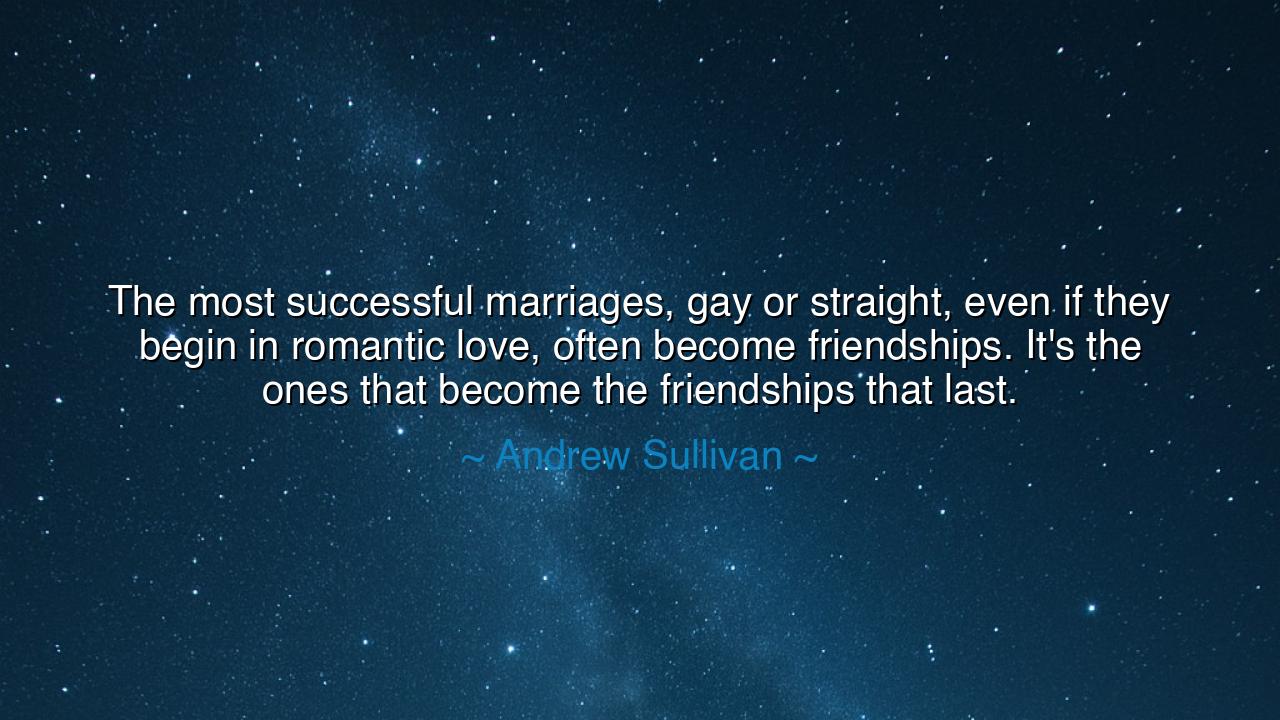
The most successful marriages, gay or straight, even if they
The most successful marriages, gay or straight, even if they begin in romantic love, often become friendships. It's the ones that become the friendships that last.






"The most successful marriages, gay or straight, even if they begin in romantic love, often become friendships. It's the ones that become the friendships that last." – Andrew Sullivan. In these words, Sullivan unveils a profound truth about the nature of relationships and the enduring quality of friendship. Love, in its initial stages, is often seen through the lens of romance—a heady, passionate connection that sweeps individuals off their feet. But as the years pass, the true foundation of lasting unions reveals itself: the companionship that grows from mutual respect, shared values, and a deep, abiding friendship. Romantic love, while powerful, can be fleeting, but the connection rooted in friendship provides the strength and resilience that sustain relationships through the challenges of time.
In the ancient world, friendship was considered one of the highest forms of human connection, more enduring than romantic or familial bonds. The Greek philosopher Aristotle spoke of friendship as a virtue, something that not only enhances personal happiness but is essential to living a flourishing life. In his Nicomachean Ethics, Aristotle distinguished between different types of friendship, noting that the truest and most enduring form is one based on mutual respect, goodwill, and shared virtue—the very qualities that Sullivan refers to when he speaks of friendship as the cornerstone of a lasting relationship. A romantic relationship that evolves into a friendship aligns with this ideal: it matures from initial desire into a connection rooted in deeper, more sustainable qualities.
Consider the legendary partnership between Alexander the Great and Hephaestion, his closest companion and confidant. Though their relationship began with the intensity of youth, their bond transcended mere physical attraction or romantic fervor. Hephaestion was not only Alexander’s lover but also his friend, adviser, and confidante. Their bond, built on shared experiences and mutual trust, became the foundation of Alexander's success and resilience, even in the face of immense challenges. True friendship allows individuals to transcend the fleeting passions of romance and build a partnership that sustains them through life’s trials. Alexander's grief at Hephaestion's death was not just that of a lover, but that of a man who lost his most cherished friend.
In more recent history, the relationship between John Adams and Thomas Jefferson exemplifies how deep friendship can transcend political differences and lead to enduring influence. Though initially differing in political ideologies, their relationship grew from a shared commitment to their country to a lasting friendship based on mutual respect and shared values. They eventually reconciled and maintained a deep bond for years, despite the demands and turbulence of public life. Their friendship was not rooted in the romantic ideals of their youth but in a respectful and sustained collaboration that allowed them to endure the many challenges they faced, from personal loss to political strife. In a similar way, successful romantic relationships that evolve into friendships are marked by this enduring respect and the ability to weather life’s inevitable challenges together.
Sullivan’s words also call attention to the evolution of love over time. Initial passion and romanticism may serve as the spark, but it is the steady, supportive foundation of friendship that endures and strengthens the bond. This is not to say that romance fades, but that it transforms into something deeper, a connection that is based not just on attraction but on the shared journey of life. In true partnerships, whether romantic or platonic, it is the ability to grow together—to support, understand, and encourage each other—that gives the relationship its lasting power. The love that survives and flourishes over time is one that learns to blend affection with companionship.
The lesson Sullivan imparts is profound: romantic love is not the end, but often the beginning of a deeper, more enduring connection. To have a lasting relationship, we must not only nurture the initial attraction but also cultivate a friendship that can endure beyond the first rush of passion. Mutual respect, shared values, and emotional support are the cornerstones of this friendship, and they must be tended to with care and dedication. A relationship that evolves into a friendship will weather the storms of life, growing stronger with each passing year.
In our own lives, we should take Sullivan’s insight to heart. Whether in romantic relationships, friendships, or family bonds, we must recognize the importance of cultivating deep connections based on trust, understanding, and respect. Let us strive to be not only passionate partners but also true companions to those we love. Let us see friendship as the ultimate foundation of any lasting relationship, knowing that it is the shared journey and the quiet support of one another that will carry us through life’s many seasons. By embracing the spirit of companionship, we build relationships that are not only fulfilling but also enduring, grounded in the deep, abiding love of true friendship.






AAdministratorAdministrator
Welcome, honored guests. Please leave a comment, we will respond soon